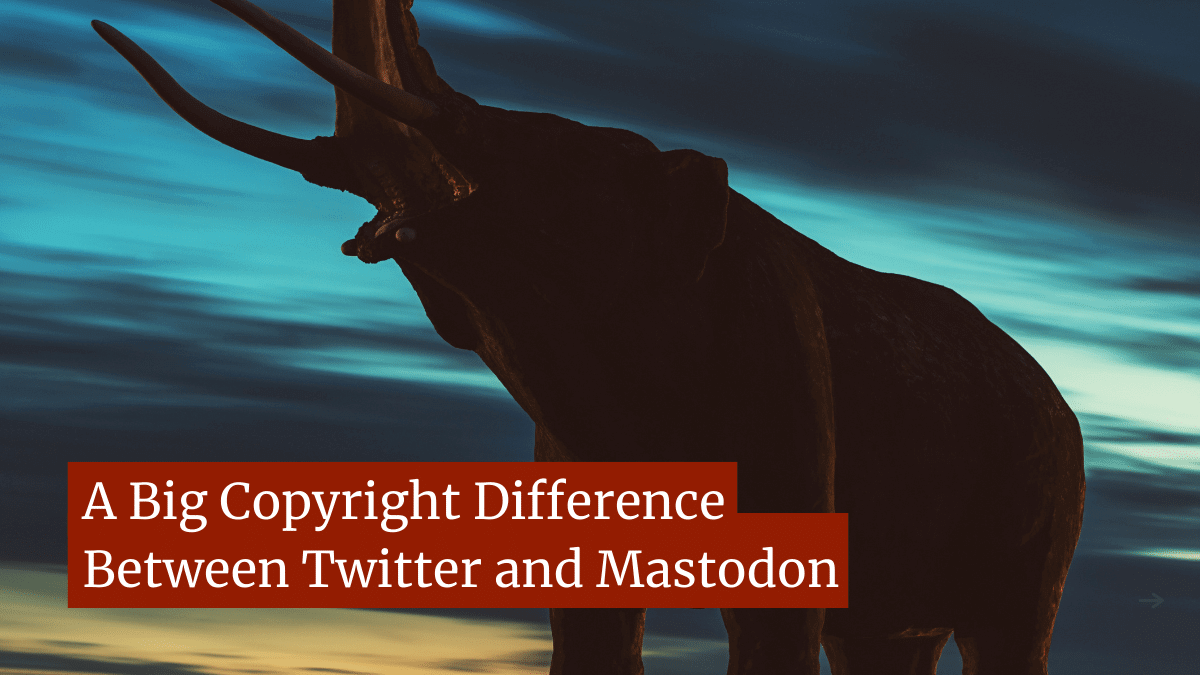The Copyright Challenge with Mastodon

As most people already know, Twitter has had a very tumultuous few weeks. Since Elon Musk purchased the company and made himself CEO, the company has been the subject of a massive layoff, an exodus of employees and a slew of other controversies.
The fallout seems to have even impacted Twitter’s copyright filtering tools. Those tools ceased to work sometime within the last week, leading users to upload full movies and even live events to the platform undetected.
All the chaos has sent many Twitter users scrambling for alternatives. One of the more popular alternatives has been Mastodon, a decentralized microblogging and social networking platform.
To be clear, Mastodon emphasizes that it is not Twitter and is very different from Twitter both in structure and function. They go as far as to call for people to change their mindset about social media before making the jump.
But, while Mastodon does have a slew of important and well-understood differences between it and a centralized platform, like Twitter, there’s a very important one that’s easy to overlook: Copyright.
Failing to understand this can actually land you in legal trouble. Fortunately, avoiding those issues is actually easy and inexpensive, if you know the steps that you need to take.
Some Mastodon Basics
The basic idea behind Mastodon is to create a decentralized social networking platform that no one entity control.
In that regard, it changes social media from something akin to Facebook or Twitter to something more like email. With Mastodon, you can sign up for an account on any server and then can use that account to interact with others on different instances.
This is similar to how you might sign up for an email account on Gmail, but you use that gmail.com account to communicate with people on Outlook, ProtonMail and other services.
As such, your Mastodon account is formed like this: @name@instance where you have to give both your username and the instance your account is on. This similar to how username@email.com identifies both the username of the account and the domain it is on.
This, in turn, opens up the greatest appeal of Mastodon. Anyone can spin up a Mastodon instance. If you want to have one just for your site or your club, you can. It doesn’t matter if only five people use it, since they can interact with other Mastodon instances and vice versa.
This gives the benefit of both having a local social network and the benefit of broad interoperability.
However, there is a major risk there that is easy to overlook and the risk comes from copyright law.
Your Obligations Under the Law
Note: This article is focusing on United States law, if you are based in a different country or your server is located in a different country, please check your local rules. Also, please note that I am not a lawyer and nothing in this article should be taken as legal advice.
The main issue with Mastodon is that, if you create your own instance, you go from being a user on a centralized social network to being the host of a small one.
Simply put, this means that other users will be uploading content to your service. This raises a problem as to what happens if that content turns out to be infringing.
Under the Digital Millennium Copyright Act (DMCA) hosts, such as yourself, are not liable for infringement by their users so long as they meet four criteria:
- Adopt and Reasonably Implement a Policy for Dealing with Repeat Infringer
- Have No Knowledge of the Infringement itself and, If You Obtain Such Knowledge, Work to Remove it
- Have a Designated Agent to Receive Notices of Copyright Infringement
- Upon Receipt of Such Notices, Work Expeditiously to Remove the Infringing Material
It is the third and the fourth that are the most commonly overlooked obstacles. Most Mastodon administrators have no interest in hosting pirated or infringing content and are happy to boot repeat infringers and infringing material when they are notified, but without a DMCA agent, there is still the potential for liability.
Unfortunately, designating a DMCA agent is not as simple as posting an email address on your site. It has to be registered with the U.S. Copyright Office. This process is simple and inexpensive, only $6 for three years, but many are unaware of this requirement.
If you don’t want your personal information in the database, you can use a third party designated agent, such as myself at CopyByte, to handle the process for you.
Either way, it’s important that you get this done. While the server you host the instance on will be protected, you need to ensure your own protection as well. Considering the low-cost and limited resources required, it makes sense to simply get it done one way or another.
How Big is the Risk?
There’s no easy way to know how big the risk is. It’s different for every single instance.
Obviously, the bigger the instance is and the more media that is shared on it, the greater the risk. Also, certain topics are riskier than others. As per Twitter’s transparency reports, the largest filers of notices are film and music firms, putting media-oriented servers in greater concern.
However, as we’ve seen time and again, even smaller sites can be targeted. In recent years, there has been an uptick in photographers targeting sites that host infringing images without a DMCA agent. This has largely been driven by the rise of speculative invoicing in that field.
So, even if your instance is small, there’s little preventing it from being detected by rightsholders combing the internet for infringing work. After all, it only takes one instance to create a major headache.
As such, even if you feel the risk is low, given the low cost, it makes sense to register an agent to be safe.
Bottom Line
Please bear in mind that all this only applies if you’re running a new instance of Mastodon. As a user, you need to ensure that you follow the rules of both your server and your country, but there is no need for a DMCA agent as a user.
However, if you are looking at setting up a new Mastodon server, this is definitely something you’ll want to consider. It can go a long way to preventing future headaches.
In the end, there’s a lot of appeal to a more distributed internet. Decentralized social networking not only addresses many of the concerns we have over social networking today, but throws back to more of the original intent and vision of the internet.
However, switching to such a system also has legal implications. Where, previously, a giant company like Twitter or Meta was responsible for figuring out the legal issues. Now, many of those challenges will be placed on small administrators, who often have no expertise, no profit motive and little time.
Fortunately, this is an issue that can be quickly addressed. A few minutes on the U.S. Copyright Office site and one can register an agent easily. However, that’s not to say that future issues won’t be worse.
Simply put, our internet has become increasingly centralized over the years and the laws that govern it have reflected that shift. Shifting back is going to come with both technical and legal challenges that will have to be addressed.
Want to Reuse or Republish this Content?
If you want to feature this article in your site, classroom or elsewhere, just let us know! We usually grant permission within 24 hours.
